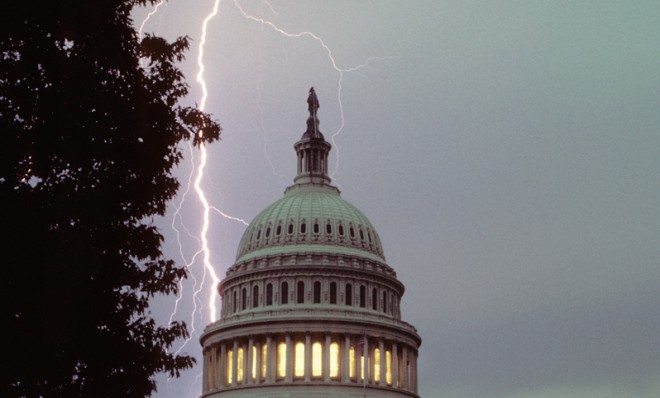Is the U.S. headed for fiscal collapse?
According to David Stockman, the U.S. economy is doomed and the government is to blame

A free daily email with the biggest news stories of the day – and the best features from TheWeek.com
You are now subscribed
Your newsletter sign-up was successful
The U.S. economy is doomed, says David Stockman in The New York Times, and the government is to blame. "We've had eight decades of increasingly frenetic fiscal and monetary policy activism intended to counter the cyclical bumps and grinds of the free market," and where has it left us? With a bogus economy propped up by massive debt and government money-printing, and headed toward another economic collapse. After the last bubble burst in 2008, the administrations of Presidents Bush and Obama, along with Congress and the Fed, have "made a series of desperate, reckless maneuvers that were not only unnecessary but ruinous." The entire economic "recovery'' has been fueled by the Fed's "radical spree of money-printing," which is "inflating yet another unsustainable bubble." As I argue in my new book, The Great Deformation, America's economic decline was sealed in 1933, when Franklin D. Roosevelt took the dollar off the gold standard and "opted for fiat money." Subsequent decades of Keynesian economics and loose monetary policy has left us $17 trillion in debt, and on a trajectory toward $30 trillion in debt within a decade. "When the latest bubble pops, there will be nothing to stop the collapse. If this sounds like advice to get out of the markets and hide out in cash, it is."
Stockman's "spittle-filled diatribe" can be reduced to one nihilistic tenet, says Neil Irwin in The Washington Post. He believes any government action leads us astray from "perfect state-of-nature capitalism." But in fact capitalism "can only exist in a framework" that is set up by government. We can disagree about "how interventionist that government or its monetary authority should be." But it's absurd to insist that "anything the state does to try to fix things is undermining some elegant capitalist order and will inevitably lead to chaos."
"It's hard to know where to begin poking holes in this," says Joe Weisenthal at Business Insider. But blaming FDR's decision to take the U.S. off the gold standard is as good a place as any. The truth is that the past 80 years "have represented a marvelous time for economic progress in America." The standard of living has vastly improved, and "the tools of modern economic management have meant that we've never had another economic crash anywhere near the level we saw during the Great Depression." The past few years alone "have been devastating" to Stockman's theory. The dollar hasn't collapsed, inflation hasn't soared, housing is recovering, and borrowing costs are not exploding. Chicken Littles like Stockman have been predicting doom for years, "and the market consistently rejects them."
The Week
Escape your echo chamber. Get the facts behind the news, plus analysis from multiple perspectives.

Sign up for The Week's Free Newsletters
From our morning news briefing to a weekly Good News Newsletter, get the best of The Week delivered directly to your inbox.
From our morning news briefing to a weekly Good News Newsletter, get the best of The Week delivered directly to your inbox.
Stockman's argument is nothing more than "cranky old man stuff," says Paul Krugman at The New York Times. It's the same sort of gold-bug, free-market absolutist demagoguery you get from Investor's Business Daily and Rush Limbaugh. Our $16 trillion economy can easily handle current budget deficits, which are now declining steeply. And after the 2008 recession, "running deficits was appropriate'' to stimulate economic growth. "Anyone who says differently hasn't done his homework."
A free daily email with the biggest news stories of the day – and the best features from TheWeek.com
Sergio Hernandez is business editor of The Week's print edition. He has previously worked for The Daily, ProPublica, the Village Voice, and Gawker.
-
 How the FCC’s ‘equal time’ rule works
How the FCC’s ‘equal time’ rule worksIn the Spotlight The law is at the heart of the Colbert-CBS conflict
-
 What is the endgame in the DHS shutdown?
What is the endgame in the DHS shutdown?Today’s Big Question Democrats want to rein in ICE’s immigration crackdown
-
 ‘Poor time management isn’t just an inconvenience’
‘Poor time management isn’t just an inconvenience’Instant Opinion Opinion, comment and editorials of the day